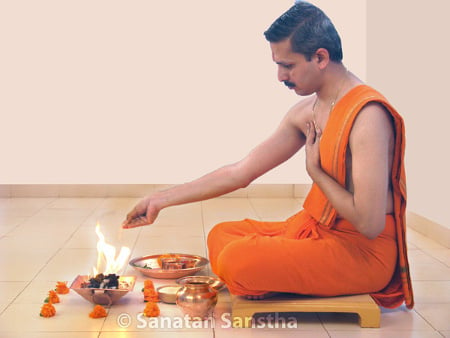Before going to the subject of the actual karmas to be performed at specific times, let us understand some minute details about the units in which a day is divided.
1. What are the various parts of the day ?
The twelve hours of a day are divided into five parts :-
A. Pratah-kal ( Dawn )
B. Sangav-kal ( Morning )
C. Madhyandin or Madhyanha-kal ( Noon )
D. Aparanha-kal ( Afternoon ), and
E. Sayanha-kal ( Evening )
2. What is a Muhurt ?
Each part of the day is made up of three muhurts. There are 30 muhurts in 24 hours of the day. One muhurt is equivalent to two ghaṭikas (An ancient Bharatiya measure of time, 1 ghatika = 24 minutes), that is, 48 minutes. In short, each of the above-mentioned parts of the day is made up of 2 hours and 24 minutes.
Karmas classified as per the time of the day
The activities to be performed in each part of a day are as given ahead :
1. Pratah-kal
Sandhya (Ritualistic worship of the Sun Deity to be performed daily at sunrise, noon and sunset by all those whose thread ceremony is performed. It is accompanied by chanting of the Gayatri mantra and meditation), ritualistic worship of Deities and Pratar-vaishvadev (daily oblation to God performed at dawn, through the Fire Deity, before the meals)
2. Sangav-kal
Earning a livelihood
3. Madhyanha-kal
Madhyanha-snan (Midday bath), Madhyanha-sandhya, Brahmayadnya (Study of the Vedas and performing tarpan (Offering water to deceased ancestors) for the sake of Deities and Sages), Bhutyadnya (One of the five Mahayadnyas where food is offered to the universal being, that is the Brahma Principle or to the world of the ghost or demons)
4. Aparanha-kal
Pitru-yadnya (Ritual for the departed ancestors), tarpaṇa, pinḍa-dan (Offering rice balls during shraddha ritual), shraddha, etc.
5. Sayanha-kal
Listening to the Puraṇas (The eighteen sacred Holy texts compiled by Sage Vyas), discussing them, Sayan-vaishvadev (Sayan is evening), and sandhya
Panchamahayadnya (Five great sacrificial fires)
अध्यापनं ब्रह्मयज्ञः पितृयज्ञस्तु तर्पणम् ।
होमो दैवो बलिर्भौतो नृयज्ञोऽतिथिपूजनम् ।। – Manusmruti
Meaning : Teaching the disciple is Brahma-yadnya; performing tarpan for the sake of departed ancestors is Pitru-yadnya; Vaishvadev is Dev-yadnya; Atithi-puja (ceremonious welcome of the guests) is Manushya-yadnya.
1. Brahma-yadnya : Swadhyay (study of the Vedas) and performing tarpan for the sake of Deities and Sages is Brahma-yadnya.
2. Pitru-yadnya : Performing tarpan for the sake of deceased ancestors (rite of offering water in the name of Sages who have been included in the list of ancestors such as Sumantu, Jaimini, Vaishampayan).
3. Dev-yadnya : Vaishvadev, Agnihotra (perpetual maintenance of the Sacred Fire) and the occasional Yadnya are all included in Devyadnya.
3 A. Vaishvadev Ritual
3 A 1. Performing Vaishvadev as atonement for day-to-day Panchasuna

The inadvertent killing of living organisms during the course of earning a livelihood is referred to as Panchasuna in the scriptures.
वैश्वदेवः प्रकर्तव्यः पञ्चसूनापनुत्तये ।
कण्डनी पेषणी चुल्ली जलकुम्भोपमार्जनी ।। – Dharmasindhu
Meaning and explanation : Death of tiny insects and ants is unavoidable when performing the five activities of pounding, milling flour, cooking, filling water and sweeping with a broom. This violence is known as Panchasuna. If this violence occurs through you, then to eliminate the impressions of sin from our mind, atonement by performing Vaishvadev should be undertaken daily.
3 A 2. How is the Vaishvadev ritual performed ?
A. Invoke the Rukmak or Pavak (Fire elements) in the yadnyakund and meditate on the fire. Sprinkle water six times around the fire and offer gandha (sandalwood paste) and flowers to the eight directions. Then, offer cooked rice as oblation. Repeating this six times around the fire, perform its Panchopacharpuja (ritualistic worship involving five steps) and partake of that Vibhuti.
B. On the day of the fast, offer Ahuti (Oblation) of uncooked rice. (Since rice is not cooked on the day of the fast, uncooked rice is offered instead as Ahuti)
C. In times of calamities, this ritual can simply be performed by using water (by releasing water into a Tamrapatra – a round, shelving copper dish – in the name of Deities ).
D. When travelling, mere recitation of the Vaishvadevsukta, or the script of the above ritual provides the benefit of performing a Panchamahayadnya.
4. Bhuta-yadnya (Baliharaṇ) : One part of the food taken for Vaishvadev is offered as Bali (Sacrifice) to the Deity. In Bhutayadnya, the Bali is offered on the ground instead of in the fire.
5. Nru-yadnya or Manushya-yadnya : As preached by Manu ( 3.70 ), honouring guests amounts to Nru-yadnya or Manushya-yadnya. Offering food to a Brahmaṇ is also a Manushya-yadnya.
Importance of Panchamahayadnya
1. Food from the house in which Panchamahayadnya is not performed cannot be partaken of by renunciants, Saints and deceased ancestors’ souls at the time of shraddha, because it is not purified.
2. The house in which the yadnya is performed and the food left over is partaken of, is blessed with Shanti (Peace) and is the abode of Shri Annapurna (Deity of food ).
Which karmas are prohibited during the day ?
1. Regarding Sleep
Scriptures advise us to avoid sleeping during the day, as this time is favourable for spiritual practice. Let’s refer to Shlokas from the Skand-Puran.
आरोहणं गवां पृष्ठे प्रेतधूमं सरित्तटम् ।
बालातपं दिवास्वापं त्यजेद्दीर्घं जिजीविषुः ।। – Skand-Puraṇ, Brahmakhanḍ, Dharmarṇyamahatmya, 6.66-67
Meaning : One who aspires to live long should not climb on the back of a cow or a bull, should not allow the smoke from a funeral pyre to touch his body, should not sit on the bank of a river (other than the Ganga) at dusk, should not allow the rays of the rising sun to touch his body and should not sleep during the day.
Science underlying the suggestion that we should not sleep during the day
A. From amongst the two major time periods of day and night, more energy is expended in performing spiritual practice at night. This is because the increased activity of negative energies makes the night unfavourable for spiritual practice.
B. One should perform as much spiritual practice as possible during the day and contemplate on it at night, and making a resolve to rectify the mistakes made during the day, attempt to perform perfect spiritual practice the next day. This is what God expects from us. Hence one should avoid sleeping during the day.

 Nine benefits of waking up at the Brahmamuhurt
Nine benefits of waking up at the Brahmamuhurt How to plan your day effectively?
How to plan your day effectively? Astrological viewpoint : On which days should nails be cut?
Astrological viewpoint : On which days should nails be cut? Varsha Rutucharya – a key to remaining healthy during the rainy season
Varsha Rutucharya – a key to remaining healthy during the rainy season Actions required to be performed after cleansing the teeth
Actions required to be performed after cleansing the teeth Cleansing the teeth
Cleansing the teeth